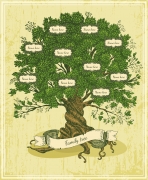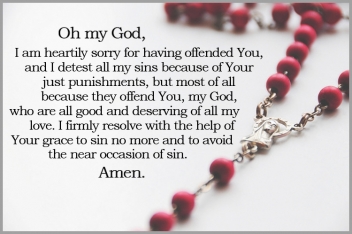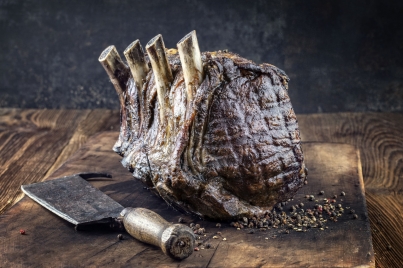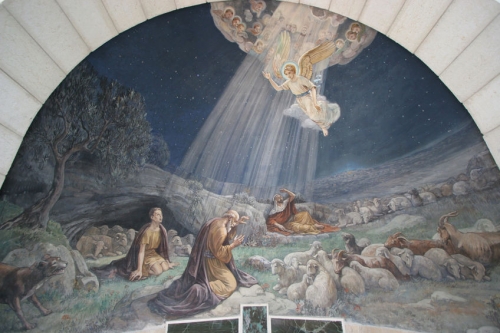
Volume I/ Issue 9/ December 2016

From the Editorial Desk:

Almost every year at Christmas, when my brother and I were growing up, my mother would tell this story about the “Three Trees”. I thought I would share it with you this Christmas. Its not a devotion really, and it is not necessarily profound. But it does have a simple truth that I would like to leave with you:
A Tale of the three trees
Once upon a mountain top, three little trees stood and dreamed of what they wanted to become when they grew up. The first little tree looked up at the stars and said: “I want to hold treasure. I want to be covered with gold and filled with precious stones. I’ll be the most beautiful treasure chest in the world!”
The second little tree looked out at the small stream trickling by on its way to the ocean. “I want to be traveling mighty waters and carrying powerful kings. I’ll be the strongest ship in the world!”
The third little tree looked down into the valley below where busy men and women worked in a busy town. “I don’t want to leave the mountain top at all. I want to grow so tall that when people stop to look at me, they’ll raise their eyes to heaven and think of God. I will be the tallest tree in the world.”
Years passed. The rain came, the sun shone, and the little trees grew tall. One day three woodcutters climbed the mountain.
The first woodcutter looked at the first tree and said, “This tree is beautiful. It is perfect for me.” With a swoop of his shining axe, the first tree fell. “Now I shall be made into a beautiful chest. I shall hold wonderful treasure!” the first tree said.
The second woodcutter looked at the second tree and said, “This tree is strong. It is perfect for me.” With a swoop of his shining axe, the second tree fell. “Now I shall sail mighty waters!” thought the second tree. “I shall be a strong ship for mighty kings!”
The third tree felt her heart sink when the last woodcutter looked her way. She stood straight and tall and pointed bravely to heaven. But the woodcutter never even looked up. “Any kind of tree will do for me,” he muttered. With a swoop of his shining axe, the third tree fell.
The first tree rejoiced when the woodcutter brought her to a carpenter’s shop. But the carpenter fashioned the tree into a feedbox for animals. The once beautiful tree was not covered with gold, nor with treasure. She was coated with sawdust and filled with hay for hungry farm animals.
The second tree smiled when the woodcutter took her to a shipyard, but no mighty sailing ship was made that day. Instead, the once strong tree was hammered and sawed into a simple fishing boat. She was too small and too weak to sail on an ocean, or even a river; instead, she was taken to a little lake.
The third tree was confused when the woodcutter cut her into strong beams and left her in a lumberyard. “What happened?” the once tall tree wondered. “All I ever wanted was to stay on the mountain top and point to God…”
Many, many days and night passed. The three trees nearly forgot their dreams.
But one night, golden starlight poured over the first tree as a young woman placed her newborn baby in the feed box. “I wish I could make a cradle for him,” her husband whispered. The mother squeezed his hand and smiled as the starlight shone on the smooth and the sturdy wood. “This manger is beautiful,” she said.
And suddenly the first tree knew he was holding the greatest treasure in the world.
One evening a tired traveler and his friends crowded into the old fishing boat. The traveler fell asleep as the second tree quietly sailed out into the lake. Soon a thundering and thrashing storm arose. The little tree shuddered. She knew she did not have the strength to carry so many passengers safely through with the wind and the rain. The tired man awakened. He stood up, stretched out his hand, and said, “Peace.” The storm stopped as quickly as it had begun. And suddenly the second tree knew he was carrying the king of heaven and earth.
One Friday morning, the third tree was startled when her beams were yanked from the forgotten woodpile. She flinched as she was carried through an angry jeering crowd. She shuddered when soldiers nailed a man’s hands to her. She felt ugly and harsh and cruel. But on Sunday morning, when the sun rose and the earth tremble with joy beneath her, the third tree knew that God’s love had changed everything. It had made the third tree strong. And every time people thought of the third tree, they would think of God. That was better than being the tallest tree in the world.
The next time you feel down because you aren’t where you want to be in life, sit tight and be happy because God is thinking of something better for you.
Merry Christmas!


The Lineage of Christ
I try to emphasize in my sermons and other talks the importance of reading Holy Scripture. Simply put, not enough of us read the Good Book as often as we should. One of the excuses that people often cite for not reading the Bible is it is difficult to read. Especially in regards to the Old Testament, with the names of people or the names of places, it is understandable because many of the names are in fact difficult to read. The other reason I have heard people cite in not reading the Bible . . . . although people do not often like to admit it out loud . . . . is that to them reading the Bible is boring. Again, it is understandable that people might feel this way especially in regards to the Old Testament because so much of the Old Testament is filled with lists of people whose names are hard to pronounce. And yet this is pretty much how St. Matthew chose to begin the Gospel attributed to him. He began his Gospel by relating the lineage of Our Blessed Saviour. Why would St. Matthew do this to begin with?, we ask ourselves. In all fairness, St. Luke also includes the genealogy of Our Lord. But at least in the example of St. Luke's Gospel, at least St. Luke put his lineage in the third chapter. In other words, he doesn't start out with it like St. Matthew does at the very beginning.
And so the question remains: why was including this lineage so important to St. Matthew?
When we think about other examples, oftentimes we also place great importance on lineage. Have you ever watched a dog show, for example. The owners of these championship caliber dogs take great pride in listing the "pedigree" of the dogs they show. And with us human beings as well, there are many people interested in genealogy. Just look at websites such as "Ancestry.com," where people go there to look up where they came from in regards to their relatives. Even in regards to cars, you can look up their history to see who owned a car before you or property . . . . who owned a house or a piece of property before you. So, you see, we are interested in lineage as well. In part, this tells us where we came from. To the Jews, though, they were very interested in genealogies. Getting back to the subject at hand, the very first verse of the Gospel of St. Matthew begins: "The book of the generation of Jesus Christ, the Son of David, the Son of Abraham." (St. Matthew 1:1)
As mentioned earlier, knowing where people came from was very important to the Jewish people. If we look at the Old Testament, especially the Book of Genesis, we will see multiple lists of generations for famous people in the Bible. In part, the Jews wanted to keep accurate records to know who was "pure" and who was "not pure."
Why is any of this important for our consideration? Well, it shows the importance of why something was written . . . or why something was highlighted for its' importance. But beyond that, this still has great meaning for us. All of us have our roots . . . . where we come from. It may be that we only know our parents and/or our grandparents but so often family history or stories of our family members get passed down from generation to generation. So often we hear amusing stories about great-uncles or great-grandparents, for example, as we gather together at Christmas dinners or other family gatherings. It's not just "amusing stories" that get passed on from generation to generation. We learn from our parents and those who came before us. We learn both good things and bad things, quite frankly. Human beings learn much better by example or by experience, I am afraid. A mother can tell a young child over and over and over not to touch a hot stove but until the child actually touches the hot stove and gets burned, the child will listen to "experience of getting burned" better than listening to the mother. I know as I have grown older, I have discovered that I do the things that my parents did. In other words, I find myself saying the things that my mother would say. Or I find myself doing the things that my father does.
In a spiritual sense, we have a "spiritual heritage" as well.
Going all the way back to the very first chapter of the Book of Genesis: "Let us make man to our image and likeness:" (Genesis 1:26) "And God created man to his own image: to the image of God he created him:" (Genesis 1:27). Our heritage is of God. We were created by Our Heavenly Father. But as is often the case, it did not take very long for everything to fall apart real fast. Adam and Eve proved they would rather serve themselves than to serve God. They were not content to be in the Garden under the guidance of God. They preferred to guide themselves. This unfortunately has not changed since then. Man still desires to guide himself. Or should I say more accurately that Man is guided by his desires. We want things our own way. We want to do things how we want them and when we want them. We do not like anyone telling us what to do . . . . even God Himself.
But this is why the lineage of Our Blessed Saviour is so wonderful. It not only tells the roots of Our Blessed Saviour but it also points to the reason for Our Blessed Lord's birth.
If you read through Scripture, very often Our Blessed Saviour is referred to by people as the Son of David. Multiple examples throughout all the Gospels list people calling Our Saviour by this title. The reason this point is so important is because it points out that Our Lord is royal. The fact that Our Lord's lineage was traceable back to David reminded the Jews of the great promise of David through His kingship. It reminds us today that Christ is Our King and that we owe Him our obedience as faithful servants. So often we place our trust in everything but God. But the faithful, devout Christian will continue to serve the King of the Universe, Our Blessed Saviour.
St. Matthew, in short, began his Gospel with the genealogy of Christ to show not only where He came from but to also point to what His purpose was in this world. For our part also, we must never forget where we came from. "God created man . . . " Our roots are found in God. We need to daily remind ourselves that we belong to God. We need to remind ourselves that our roots lie in the Almighty. Despite the fact that we were created by God, so often our desires lead us far from Him. But our God loves us so much that He not only created us but He also went looking for us . . . . to save us from ourselves . . . to save us from our own wicked desires. He sent His only Son into the world to save us from our sins . . . to save us from something that we could not save ourselves from.

The Funny Fharmacy
Proverbs 17:22
A joyful mind maketh age flourishing: a sorrowful spirit drieth up the bones.







 Questions and Answers
Questions and Answers
Is it possible to obtain a list of who was invited to the conclave?
A list of all of those we personally notified is kept somewhere in the archives. However, that list would not be complete, because some of those we notified in turn notified others.
Each and every bishop consecrated in the Thuc-des Lauriers and Thuc-Carmona lines was notified of the election. This would have been done not only by us, but by the late Miss Heidi Hagen of Geneva, Switzerland, who had contact with them as well.
All of the sedevacantist listings in the late Radko K Jansky's Traditionalist Catholic Directory, which he published from Saint Louis, Missouri. It contained listings of all Traditionalist chapels in the world. He made a serious effort to keep it up to date until shortly before his death in about 1991.
Notable people, who were contacted in addition to the above would be Malachi Martin, who personally endorsed the pre-election book, Will the Catholic Church Survive the Twentieth Century? Elizabeth Gerstner was notified. Also Doctors Hiller and Heller of Einsicht out of Germany, a sedevacantist publication. The publishers of Veritas out of Louisville, Kentucky were notified.
At one point over 200 packages with the pre-election book were sent out worldwide.


The Christmas Gift
There are only twelve shopping days until Christmas. Yes, the world tells us there are fourteen, but Sundays should not be shopping days. However, if we are shopping for what we should be, there are fourteen shopping days until Christmas.
A child about ten years old got to thinking before Christmas time. Just whose birthday is Christmas? It is Jesus Christ's. And so why aren't we getting Him presents like we get presents on our own birthdays? He did not tell anyone of his thoughts, because he did not want to give up the presents already starting to accumulate under the Christmas tree.
We are reminded to put Christ back into Christmas, and yet are we really doing this?
What presents do we have ready to deliver to Jesus Christ on His holy Birthday? Advent is already half over, and yet have we done anything to really prepare for Christmas. Instead, we have been preparing for a neo-pagan holiday called X-mas. Yes, I know this is just an abbreviation, but it demonstrates the point that there is a difference between Jesus' Nativity and the modern commercialized pagan celebration we can call X-mas, for Christ has been "Xed" out of the equation.
And so let us look at Jesus' Christmas list; the only important one there is. What does Jesus want for Christmas? The Father possesses Heaven and Earth already and share them with Jesus and the Holy Ghost. What is the one thing the Trinity has given away, given us control of?
God has given us free will, which means we have possession of our own hearts.
We have two choices. We can keep our heart for our own self and do things our way. And this is what most people do. These are the people out there frantically trying to find presents for those around them, to improve their standing with them. When we keep our heart for our own self, we put our will first. “My way or the highway,” is out motto. Oh we may recite a prayer or two.
This people honoureth me with their lips: but their heart is far from me. (Matthew 15:18)
And it is not the lips that God wants. Anyone can give God lip service. Don't we give other people lip service with no intention of keeping our word?
Not every one that saith to me, Lord, Lord, shall enter into the kingdom of heaven: but he that doth the will of my Father who is in heaven, he shall enter into the kingdom of heaven. (Matthew 7:21)
Now we come to our other option. God created our heart to be His, but He wants us to willing give it to Him out of our love for Him. This is why He gave us free will. We cannot love, if we do not have the ability to hate. Yes, love can exist without hate, but not without the ability to hate.
And we have known, and have believed the charity, which God hath to us. God is charity: and he that abideth in charity, abideth in God, and God in him. (I John 4:16)
And what are the two great Commandments? They both begin: “Thou shalt love...” The first Commandment is the Commandment of love of God with our entire being. And the second is that of love of neighbor.
Jesus has given us an example of how far love should be willing to go.
Greater love than this no man hath, that a man lay down his life for his friends. (John 15:13)
Jesus went a step further, He laid down His life for His enemies. As sinners we are God's enemies, but God wants to change us into His friends.
For this is the will of God, your sanctification; … (I Thessalonians 4:13)
God wants to make us holy, if only we will step out of the way and let Him work in our hearts.
And I will give you a new heart, and put a new spirit within you: and I will take away the stony heart out of your flesh, and will give you a heart of flesh. (Ezechiel/Ezekiel 36:26)
Notice God takes out our hard heart and replaces it with a soft heart. We cannot do this heart surgery on our self, but must turn our self over to the Divine Heart Surgeon.
In closing let us make Jesus' prayer our own:
Father, if thou wilt, remove this chalice from me: but yet not my will, but thine be done. (Luke 22:42)
Have a blessed Christmas,
+Michael pp

The Pope Speaks
Advent: A Little Lent

Advent is a good time to fast voluntarily in preparation to celebrate the greatest birthday of the year, that of our Lord Jesus Christ.
The early Christians observed more than one fast in the year. Both the east and the west observe the fast of Lent before Easter. Fasting during Advent has been reduced in the west, whereas it retains its ancient vigor in the east.
Advent consists of up to four weeks prior to Christmas, beginning four Sundays before Christmas. This year (2016) Advent is four complete weeks. Five fast days are still of obligation. First the Vigil of the Immaculate Conception (December 7) is a day of fast and partial abstinence. The third week of Advent is the Ember week with the customary fasting on Wednesday, Friday and Saturday with partial abstinence on the Wednesday and Saturday and the customary complete abstinence on Fridays. Finally the Vigil of Christmas (December 24) is a day of fast and complete abstinence.
“The holy Fathers teach that our first combat should be with the vice of gluttony, which is called gastrimargia by the Greeks. For in vain do we rise up against the others until this is eliminated, which supplies nutriment to the rest.” 1 This is why we fast. The church requires certain fasts, but we should exceed the weak laws of today on occasion.
In fact, many teach that we cannot overcome lust until we first overcome gluttony.
Let us consider, that the first sin was a sin of gluttony, eating the forbidden fruit.
And the woman saw that the tree was good to eat, and fair to the eyes, and delightful to behold: and she took of the fruit thereof, and did eat, and gave to her husband who did eat.(Genesis 3:6)
The rule is simple, we should eat to live, not live to eat.
And yet how much are we told the opposite today by the world? Saint Ambrose says: “Fasting is a good sauce for meat.” By abstaining, when we do finally come to the feast, we enjoy the meal much more. Consider the person, who eats ice cream daily. Soon he finds that ice cream doesn't mean much to him. However, take it away for a month, he will relish his first bowl upon return.
To whom he said: Can you make the children of the bridegroom fast, whilst the bridegroom is with them? But the days will come, when the bridegroom shall be taken away from them, then shall they fast in those days.(Luke 5:34-5)
If we read the Scriptures, fasting was a common part of life for the Chosen People of both testaments. The Apostles were chided for not fasting, and we read Jesus' response above. On the feast of the Ascension the Bridegroom left and we returned to fasting.
In the book Our Own Will: And How to Detect It In Our Actions we read (pages 124-5): “The great want of the world at the present day is penance; the vast mass of humanity is engrossed with the pursuit of honors, riches, and pleasures; there is no thought of mortification, no feeling of compassion for the sufferings of our Divine Lord. His Sacred Heart hungers and thirsts after some kindred spirit in which to find sympathy and gratitude, and active, ardent compassion with Its yearnings and longings; but It is very often disappointed.” http://amzn.to/2f00w1b
Jesus wants us to do penance. He sent His mother ninety-nine years ago to ask for two things: prayer and penance.
Advent is a good time to bring Jesus these two presents He so earnestly desires of us for our own salvation and that of the whole world.
Let us make this Advent where we bring our hearts closer to the Sacred Heart of Jesus.
+Michael pp
1 A Treatise of Spiritual Life, page 87


Living Catholic
The Benefit of Self-Examination
He had been there a hundred times before.
Holding short of the runway, the seasoned pilot of the single-engine airplane waited for clearance to take off. It was just another routine flight, and as he waited his mind wandered. The process had become so familiar that he only glanced at his pre-flight checklist and didn't bother going through it. Receiving clearance from the control tower, he added power and took off. However, as the airplane lifted off the ground he realized something was wrong, and moments later the airplane crashed!
Every pilot knows that his life and the lives of his passengers depend upon not only his skill but also on the thoroughness of his pre-flight safety check. Similarly, a thorough evaluation of our spiritual lives is essential.
When should we examine ourselves?
- Before confession
The early Church gathered for Mass weekly and sometimes even daily. (See Acts 2:42, 46; 20:7.) They would have had to have a spiritual self examination and confession as needed on a weekly and or a daily basis before participating in the Mass.
- During our Evening prayers.
Many are not able to go to Mass on a daily basis because of their work etc. Some can't even go weekly on Sunday because there is no Priest to be able to give Mass. In those cases our Spiritual self-examination should become a regular part of our lives, not just before we take part at Mass, but at any time, any where, and on a daily basis.
By taking time on a daily basis to search our hearts for sins that are unconfessed, we demonstrate to God our desire to walk blamelessly before Him.
A good time to do this would be in the evening before going to bed. It is a perfect time to look back on the day and see where you failed and areas in your life that need to be worked on.
Below I have taken excerpts from the Little Flower Prayer Book, that can help you with this. Remember, the goal of self-examination is to identify sin.
What is a good way to examine ourselves?
Examination by using the ten commandments.
I. Have you doubted in matters of faith? Murmured against God at your adversity or at the prosperity of others? Despaired of His mercy?
Have you believed in fortune tellers or consulted in them?
Have you gone to places of worship belonging to other denominations?
Have you recommended yourself to God? Neglected your morning or night prayers? Omitted religious duties or practices through motives of human respect?
Have you rashly presumed upon God's forbearance in order to commit sin?
Have you read books, papers, and periodicals of anti-Catholic or atheistic tendency? Made use of superstitious practices? Spoken with levity or irreverence of priests, religious, or sacred objects?
II. Have you taken the name of God in vain? Profaned anything related to religion?
Have you sworn falsely, rashly, or in slight and trivial matters? Cursed yourself or others, or any creature? Angered others so as to make them swear, or blaspheme God?
III. Have you kept holy the Lord's day, and all other days commanded to be kept holy? Bought or sold things, not of necessity, on that day? Done or commanded some servile work not of necessity? Talked, gazed, or laughed in the church? Profaned the day by drinking, gambling, or in other ways?
IV. Have you honored your parents, superiors and masters, according to your just duty? Deceived them? Disobeyed them? Have you failed in due reverence to aged persons?
V. Have you procured, desired, or hastened the death of anyone? Borne hatred? Oppressed any one? Desired revenge? Not forgiven injuries? Refused to speak to others? Used provoking language? Injured others? Caused enmity between others?
VI and IX. Have you been guilty of any sin against holy purity in thought word, or deed?
VII. Have you been guilty of stealing or of deceit in buying, or selling, in regard to wares, prices, weights or measures? Have you willingly damaged another man's goods, or negligently spoiled them?
VIII. Have you borne false witness? Called injurious names? Disclosed another's sins? Flattered others? Judged rashly?
X. Have you coveted unjustly anything that belongs to another?
Examination of the Precepts of the Church
- Have you gone to confession at least once a year? Received Holy communion during Easter time?
- Have you violated the fasts of the Church, or eaten flesh-meat on prohibited days?
- Have you sinned against any other commandment of the Church?
After the Examination
Make sure when we ask ourselves these questions we answer them honestly. Once you discover the sins of which you have been guilty, you should ask yourself if you truly have a heartfelt sorrow for those sins. If not, ask God to give you a sorrowful heart for those sins you have committed.
Considerations to Excite in our Heart True Contrition for Our Sins
Consider who God is, and how good and gracious and good He is to you, Whom you have so often and so deeply offended by these sins. He made you-He made you for Himself, to know, to love, and serve Him, and to be happy with Him forever. He redeemed you by His blood. He was borne with you in mind and waited for you so long. He it is Who has called you and moved you to repentance. Why have you thus sinned against Him? Why have you been so ungrateful? What more could he do for you? Oh, be ashamed, and mourn, and despise yourself, because you have sinned against your Maker and your Redeemer, Whom you ought to love above all things!
Consider the consequences of even one mortal sin. By it you lose the grace of God. You destroy peace of conscience; you forfeit the felicity of heaven, for which you were created and redeemed; and you prepare yourself for eternal punishment.
In conclusion...
let me leave you with some Scripture to meditate on, and some final words.
(I Corinthians 11:31 &32) But if we would judge ourselves, we should not be judged. But whilst we are judged, we are chastised by the Lord, that we be not condemned with this world.
(Hebrews 12:6) For whom the Lord loveth, he chastiseth;
When things are going well for us we are not easily motivated to the activity of self examination. But when a major conflict arises and our spirit is grieved, we have the most effective motivation to search out the inner motives, actions, words and attitudes of our hearts.
(Proverbs 20:27) The spirit of a man is the lamp of the Lord, which searcheth all the hidden things of the bowels.
This is what God meant when He said, “reproofs of instruction are the way of life:” (Proverbs 6:23) “He that loveth correction, loveth knowledge: but he that hateth reproof is foolish.” (Proverbs 12:1)


Catechism Catch Up!
Who were the first man and woman?
The first man and woman were Adam and Eve.
(See Genesis 2:19 and 3:20)
(Genesis 1:26, 27) And he said: Let us make man to our image and likeness...And God created man to his own image: to the image of God he created him: male and female he created them.
Were Adam and Eve innocent and holy when they came from the hand of God?
Adam and Eve were innocent and holy when they came from the hand of God.
(Genesis 1:27,28,31) And God created man to his own image.... male and female he created them. And God blessed them.... And God saw all the things that he had made, and they were very good.
(Wisdom 2:23) For God created man incorruptible.
(Ecclesiastes 7:30)
This I have found, that God made man right.
The Fall of Adam and Eve
(Genesis 3:1-3)
Now the serpent was more subtle than any of the beasts of the earth which the Lord God had made. And he said to the woman: Why hath God commanded you, that you should not eat of every tree of paradise? And the woman answered him, saying: Of the fruit of the trees that are in paradise we do eat: But of the fruit of the tree which is in the midst of paradise, God hath commanded us that we should not eat; and that we should not touch it, lest perhaps we die. And the serpent said to the woman: No, you shall not die the death. For God doth know that in what day soever you shall eat thereof, your eyes shall be opened: and you shall be as Gods, knowing good and evil.
And the woman saw that the tree was good to eat, and fair to the eyes, and delightful to behold: and she took of the fruit thereof, and did eat, and gave to her husband who did eat. And the eyes of them both were opened: and when they perceived themselves to be naked, they sewed together fig leaves, and made themselves aprons. And when they heard the voice of the Lord God walking in paradise at the afternoon air, Adam and his wife hid themselves from the face of the Lord God, amidst the trees of paradise. And the Lord God called Adam, and said to him: Where art thou? And he said: I heard thy voice in paradise; and I was afraid, because I was naked, and I hid myself. And he said to him: And who hath told thee that thou wast naked, but that thou hast eaten of the tree whereof I commanded thee that thou shouldst not eat? And Adam said: The woman, whom thou gavest me to be my companion, gave me of the tree, and I did eat. And the Lord God said to the woman: Why hast thou done this? And she answered: The serpent deceived me, and I did eat. And the Lord God said to the serpent: Because thou hast done this thing, thou art cursed among all cattle, and beasts of the earth: upon thy breast shalt thou go, and earth shalt thou eat all the days of thy life. I will put enmities between thee and the woman, and thy seed and her seed: she shall crush thy head, and thou shalt lie in wait for her heel. To the woman also he said: I will multiply thy sorrows, and thy conceptions: in sorrow shalt thou bring forth children, and thou shalt be under thy husband' s power, and he shall have dominion over thee. And to Adam he said: Because thou hast hearkened to the voice of thy wife, and hast eaten of the tree, whereof I commanded thee that thou shouldst not eat, cursed is the earth in thy work; with labour and toil shalt thou eat thereof all the days of thy life. Thorns and thistles shall it bring forth to thee; and thou shalt eat the herbs of the earth. In the sweat of thy face shalt thou eat bread till thou return to the earth, out of which thou wast taken: for dust thou art, and into dust thou shalt return. And Adam called the name of his wife Eve: because she was the mother of all the living. And the Lord God made for Adam and his wife, garments of skins, and clothed them. And he said: Behold Adam is become as one of us, knowing good and evil: now, therefore, lest perhaps he put forth his hand, and take also of the tree of life, and eat, and live for ever. And the Lord God sent him out of the paradise of pleasure, to till the earth from which he was taken. And he cast out Adam; and placed before the paradise of pleasure Cherubims, and a flaming sword, turning every way, to keep the way of the tree of life”
- The fall seems to take place early, quickly, with no resistance at all.
Genesis 3 appears to have no struggle at all. Neither Eve nor Adam raise so much as one word of protest or argument against Satan. They appear to be easy prey for his cunning attack. One would have expected Eve to at least have said something like, “Well, what do you know, a talking snake. Adam, come over here. You’ve got to see this!” It all happened so fast, so easily. Even in his unfallen state, man was no match for the wiles of Satan.
- Satan and Eve are prominent in the account of the fall; Adam is less prominent.
Adam’s sin is more passive in nature, while that of the serpent and Eve is more aggressive. The leader followed, and the followers led.
- The fall reverses the divinely established order of authority.
The “chain-of-command” is God: Adam, Eve, creature (which surely includes the serpent). The order of actions related to the fall are: serpent, Eve, Adam. When God confronts those responsible for the fall, the order is that of His chain-of-command: Adam (verse 9), Eve (verse 13), the serpent (verse 14). It is little wonder that the one who rebelled against God’s authority over him (Isaiah 14:12-15; Ezekiel 28:12-15) would seek to overturn God’s order of authority.
- Eve was deceived; Adam was not.
Eve did not know what she was doing as Adam did. Adam’s sin was the more culpable, both because he was the one who was to lead and because he sinned knowingly rather than ignorantly.
- None of the participants assumes responsibility for their actions, and no one repents of their sin.
Rather than assume responsibility for their own actions, Adam and Even passed the responsibility on. From their actions in Genesis 3:7-8 and Job’s statement in Job 31:33, we know Adam tried to conceal rather than confess his sin.
- Satan’s deception greatly distorted Eve’s perspective.
The God who generously provided all things for Adam and Eve to “richly enjoy” is quickly perceived as a tight-fisted tyrant because one fruit is forbidden. The forbidden fruit was now seen as desirable even though it was deadly. The tree of life was overshadowed by the tree of the knowledge of good and evil. Eve saw only this one forbidden tree as “good for food” and as a “delight to the eyes,” when in reality every tree in the garden had these same qualities (see Genesis 2:9).
- Satan succeeded in persuading Adam and Eve to trust his words, while doubting and disobeying God’s Word.
The Word of God which so recently brought the universe into existence (see 1:14) was first questioned and then denied once it forbade the fruit of the forbidden tree.
- Man’s disobedience in the garden is the fruit of unbelief, just as his obedience would have been the fruit of faith.
Why was the tree of the knowledge of good and evil forbidden? Our text indicates a fascinating twist in Eve’s thinking. The tree of the knowledge of good and evil enabled one to know good and evil (see 3:22), which Eve deceptively believed was both necessary and beneficial. It was neither. Eve only needed to know that God had forbidden the fruit of this tree.
Had Eve trusted God, she would have found His Word sufficient.
She needed only to know who had forbidden the fruit, not why the fruit was forbidden. Eve needed only to know what God had said--she did not need to understand why the fruit of that one tree was forbidden.
There is an important principle to be seen here: God desires from us the obedience of faith. Such obedience is not based upon our understanding of why we are to act as God requires, but simply because it is God who requires it.
The obedience of faith is based on our faith in God, not on our understanding of why God calls one thing good and another evil. Parents teach their children to obey on the same basis. You cannot explain to a young child why an electrical outlet is dangerous. You can only forbid them to touch it, because you said so, and because they trust your word.
How quickly we shake our heads and point our finger at Eve. “How foolish not to have trusted God and obeyed His clear command,” we say. Eve’s temptation is still with us, and her sin is routinely repeated without our even knowing it because of our warped perception. We say we desire to obey God, but we want to understand why we should obey Him before we do. We want to understand why God has commanded some things and prohibited others. When we fail to understand the reason, as quickly and easily as Eve, we reject God’s commandment.



Helps to a Spiritual Life
THE following little work was compiled and published by Rev. F. Schoenbold from the writings of Rev. Joseph Schneider, S.J., the well-known, learned and pious author of excellent spiritual books.
Chapters I., II., and VI I. were written for general use, whilst all the other chapters, except those added by the translator, were written by Father Schneider for the benefit of two religious communities, for which he had been charged to compose Rules and Constitutions.
The translator, to render the work more complete by the addition of some of the practical asceticism of St. Alphonsus, has added Chapters VIII., IX., X., XX., and XXII. He takes this opportunity to recommend most earnestly the ascetical works of that great saint and Doctor of the Church, who was as eminent in ascetical science as in Moral Theology, to all who desire to sanctify themselves, whether they be religious or persons living in the world.
This work begins: “THOU hast been created to know, praise, honor, and serve God and, by so doing, to save thy immortal soul. Such is thy destiny for time and for eternity. Everything else in this world, all that exists out of and around thee, all that happens to thee, either agreeable or disagreeable, should, in the designs of God, be a help to thee to attain thy end. From this it follows that thou shouldst make use of creatures - taken in the sense given above only in so far as they may promote the attainment of thy end, and that it behooves thee to abstain from them whenever they hinder thee from securing thy destiny. In other words, thou shouldst not ask, "Does this agree with my inclinations or gratify my sensuality," but rather, "Will this help me to reach my eternal destiny?" In order, however, to acquire such a frame of mind as will enable thee always to follow and obey this principle, thou shouldst strive to become perfectly indifferent concerning all that surrounds thee, all that happens to thee, so that thou wilt not desire or will health, wealth, honor, a long life, etc., any more than their opposites, so long as the divine will, or the duties of thy state and the exigencies of thy condition, or due charity and justice towards thy fellowmen, do not require thee to give the preference to anyone of these. It behooves thee to be indifferent concerning those things that are not in thy power, but are dependent on the wise and loving providence of God, who alone knows what is best for thee in every particular case. Thou shouldst not wish one thing more than another, but shouldst abandon thyself with childlike confidence and the most perfect conformity of judgment and will to the Lord, inasmuch as thou desirest and choosest that only which is calculated to promote best the end of thy creation.
In order to acquire this holy indifference, in which life's only true wisdom consists, thou shouldst often ask thyself and answer these questions:
(1) What profit is there in enjoying pleasure and good health during life, if I render myself miserable for all eternity? What harm is there in leading a life of suffering, pain and privations, if I can thereby render myself forever happy?
(2) What will it avail me to be very learned, refined and accomplished, if I do not escape eternal punishment? What will it hurt me to be poor, illiterate and unrefined, if it helps me to acquire ever lasting bliss?
(3) What advantage is there in my being honored and esteemed during life, and after death to cast my lot with the reprobate? What harm is there in living in an humble station and in being despised during life, if this promotes and secures my eternal welfare?
(4) What benefit is there in a long but ill-spent life on earth, if it leads to endless misery? What disadvantage is there in dying young, provided by my virtues I secure heaven's ineffable joys?

Spiritual Maxims: Stepping Stones to Sanctity
To Find More Books Go To:


The Fraters Kitchen
I was looking for an easy way to make a Christmas Rib Roast. It turned out PERFECT. Rib Roast can be expensive, so this is a total splurge or special occasion dish. Enjoy.

Ingredients
Direction
-
Prep
-
Cook
-
Ready In
- Allow roast to stand at room temperature for at least 1 hour.
- Preheat the oven to 375 degrees F (190 degrees C). Combine the salt, pepper and garlic powder in a small cup. Place the roast on a rack in a roasting pan so that the fatty side is up and the rib side is on the bottom. Rub the seasoning onto the roast.
- Roast for 1 hour in the preheated oven. Turn the oven off and leave the roast inside. Do not open the door. Leave it in there for 3 hours. 30 to 40 minutes before serving, turn the oven back on at 375 degrees F (190 degrees C) to reheat the roast. The internal temperature should be at least 145 degrees F (62 degrees C). Remove from the oven and let rest for 10 minutes before carving into servings.
Footnotes
 Tip
TipAluminum foil helps keep food moist, ensures it cooks evenly, keeps leftovers fresh, and makes clean-up easy.



Welllllll, "GLORIA"!!!: An Orthodox Hymn of Praise
"And suddenly there was with the Angel a multitude of the heavenly host, praising God, and saying: Glory to God in the highest: and on earth, peace to men of good will." - Gospel according to St. Luke 2:13-14
How many times have we heard these words? They're familiar to us all. Not only do we find them in Saint Luke's narrative of the Nativity of our Lord, but we hear them lifted up with the voice of the Church during the sacred Liturgy.
To this day, the words which greeted the birth of the Saviour are offered in the voice of His immaculate bride, the Church, in that hymn of praise which is understandably known as the "Gloria." It is so called from the first word of the hymn in Latin. The Gloria is prayed at Mass after the Kyrie, excepting during times of penance.
Aside from the incomparable beauty of the Gloria, there is a further lesson we can learn from this beautiful hymn. It is a lesson which is especially useful in our time. It is a lesson that will be of great assistance to making spiritual progress and in bringing peace.
If you have spent even a short amount of time among people discussing the situation in the Church and in the world, especially in that part of the discussion which takes place on the internet, you will notice that it is hardly a place conducive to peace or spiritual refreshment.
I personally have noticed that the word "orthodoxy" is often thrown about. We have the protestation of this person's "orthodoxy," or the "orthodoxy" of that person's latest writings, or the general perceived "orthodoxy" of this or that group. It often comes down to a declaration that "orthodoxy" is what is needed to fight the onslaught of sin and anti-Christian movement within the world today.
Dear soul, I am actually in agreement with the sentiment, and as we will see, genuine orthodoxy is of extreme importance. However, orthodoxy is also best approached and considered from an angle which is far removed from what most would consider.
As always, it behooves us before all else to define our terms if we are to speak of any matter. Fortuitously, it is precisely in this definition of terms that we will discover not only the difficulty with the modern understanding of "orthodoxy," but - more importantly - the rich treasure of genuine orthodoxy which is offered to us through the Church.
What does "orthodoxy" mean?
The word itself comes from a Greek word, ορθοδοξία, which was taken directly into Latin as orthodoxia. We see the word used in different forms to describe beliefs which are held to be true, or applied to those people who hold to such beliefs. For example, we have Saint John Damascene's great compendium of truths of the Faith: De Fide Orthodoxa (often known in English as "An Exact Exposition of the Orthodox Faith). Saint John Damascene's work is an incomparable testament to truth standing against the manifold winds of heresy which were current in his day, and which unfortunately remain with us for the greater part today. Here we see the term "orthodox" used to describe that Faith which is the self-same Faith delivered once to the Apostles, and which continues to be held within the Church of Christ.
Closer to our own times, we count among the works of the Ecstatic Doctor, Denis the Carthusian, the great Summa Fidei Orthodoxæ, or Summa of the Orthodox Faith, an eminently approachable and powerful systematic examination of the chief truths of the Faith. Again, we see the term "orthodox" used to describe the true Faith.
We even see the word used within the heart of the Holy Sacrifice, when the celebrant makes mention of all those with whom and for whom the Mass is offered: una cum... omnibus orthodoxis, atque catholicae et apostolicae fidei cultoribus. (Together with... all the orthodox, as well as all those who hold the Catholic and Apostolic Faith.)
As Dom Prosper Gueranger says, "t is necessary to be Orthodox, as [the Church] takes care to specify, omnibus orthodoxis, which means, those who think aright, who profess the Catholic Faith, - the Faith handed down by the Apostles." - Dom Prosper Gueranger, Chapter "Te Igitur," The Holy Mass.
We arrive here at our first definition of orthodoxy: right belief or right opinion. This is the meaning which most will give to orthodoxy, and the meaning with which the word is most often used today. This is the brief definition you will find most often in trusted sources of information, and this definition does stand to a bit of scrutiny.
As I told you, the word comes from the Greek language. "Orthodoxia" is itself a compound of two other words. Determining what these words are will determine for us what meaning we should give to the compound.
One opinion regarding the etymological roots of "orthodoxia" maintains that they are found in the words ορθός("orthos") meaning "right" or "correct" andδόξα ("doxa") which is said to come from δοκεῖν ("dokein") meaning "to think" or "to consider." I am sure you can see, then, how the compound word "orthodoxia" has come to be understood as "right thinking," "right opinion," "right knowledge." It makes sense.
It is also extremely dangerous, dear soul. For the Faith is not simply a thought. The Faith is not merely a series of truths to which we make a mental, intellectual assent, and then find that we are finished. The Faith is not a schoolhouse exercise in which we "know our Faith" simply by repeating with our mouths or thinking in our minds about what we have heard. For faith without works is dead; and the first and greatest work that the Faith must effect within us is the creation of a pure heart within us, as the Psalmist says. What is needed to effect real change in yourself and within the world is not merely orthodoxy of the mind, but the orthodoxy of the heart.
And here, my dear friend, is where we return to where we started. Remember the song of the angels? Remember the angelic strain of Glory to God in the highest? Yes, here you are about to get a small taste of what I am talking about, that orthodoxy of the heart.
When we read the words of the Gloria in Latin, we hear those opening lines, so familiar to us: Gloria in excelsis Deo! (As a quick aside, it is worth noting that these very words are so ancient that you will not find these exact words in Saint Jerome's Vulgate. Instead of "excelsis," Saint Jerome used the word, "altissimis," also meaning "highest." The words of the Gloria are older than the Vulgate.)
Likewise, when we read the same words as related in Greek by Saint Luke, we read: δοξα εν υψιστοις θεω.
It is not difficult to see the direct parallel between the Greek and the ancient Latin wording: δοξα εν υψιστοις θεω, "doxa en ipsistis theo," gloria in excelsis Deo. It is a fun little language exercise, and it is a prayer as well, so say it a few times and get some grace.
While you are saying it, I am certain you are noticing something. Even if you are just encountering Greek for the first time right now, you may very well have noticed that you are seeing a word that you saw a little bit earlier in another context.
Did you see? There's the word δοξα ("doxa"), again. Didn't we learn something about that above? Yes, we saw that the dictionaries will inform us that "doxa" comes from "dokein," and it means something about thinking.
Here, though, in the voice of none less than the angels heralding the birth of the Saviour, we see the word again. And here it is raised far beyond thinking and opinion. Here (and indeed throughout the Septuagint), we see the Greek word "doxa" meaning "glory."
And it is in this sense that orthodoxy must be approached today. It is in this sense that a genuine orthodoxy of the heart can be cultivated. It is in this sense that you will be able to possess your soul, dear friend.
For far beyond simple "right thought," or "right opinion," genuine orthodoxy is nothing less than "right glory."
More than anything else, the orthodox heart is enlivened by direct participation in right glory, which is to say the worship that the Church offers to Almighty God. It is in the reception of the Sacraments and the genuine living of the Liturgy of the Church that the heart is created pure within us.
Before a single line of the Gospels was written, the Church worshiped God and offered glory unto Him. Before the first chapter or heading in the catechism was even considered, there was orthodoxy - right glory - ascending to the heavens within the Church. The orthodoxy of the heart is what can unite all members of Christ's Mystical Body in the working of grace.
Consider even one who, having been born with mental impairment, nevertheless is baptized and received into the Church with joy. He or she might never once consider even a single statement from the Summa. But by incorporation into the Body of Christ, ever offering right glory unto God in the highest, that person has an orthodoxy of the heart, the orthodoxia cordis, which surpasses by far any polemic or historic consideration.
It is by this kind of orthodoxy, holding fast to the received Liturgy and Traditions, cleaving tightly to communion with the Church and our Holy Father the Pope, that we can be heirs to the second wish of the angels on that most blessed night: On earth peace to men of goodwill.
Dear soul, this is just to plant a seed, just to make a beginning. Do read your catechisms, do study the writings of the saints, do heed the unerring advice of the fathers! But do not become stuck in your mind. Do not seek to find peace through argumentation. Peace comes through being of good will. Being of good will comes from having a pure heart. Having a pure heart comes by having that heart created within us by God. The means by which God can create this heart within us comes from our offering of our hearts to Him, to His glory, in right glory, in the Sacraments and the Sacred Liturgy.
Rejoice! For God is with us.

Pray for Frater Francis Dominic as he teaches Catechism through the web site. We are also working on a plan to bring classes to the people in their homes around the United States. There is a link to our Catechism lessons. Some of the Lessons may need to be "tweaked". Catechism Lessons
We are looking to buy land for a Church and a House of Prayer. Please pray with us in finding the right place. and if you feel led, to donate money for this project you can donate by Paypal, or make check or money orders out to Vatican in Exile.
While looking for Land we are also pricing quality buildings for Hermitages and a work building for making vestments. Pray about this as well and take a look at the ones we have our eyes on!





Don't forget to continue praying for our trip to Europe the Summer of 2017. We have one visit to Hungary for sure, a visit to Ireland, and a possibility in England. Here are the countries we will be available for: Poland, Austria, Hungary, Belgium, Great Britain, Bulgaria, Croatia, Czech Republic, Denmark, Finland, France, Germany, Greece, Hungary, Ireland, Italy, Luxembourg, Macedonia, Montenegro-Serbia.
Every month we are very close with our budget. It takes money to be available to people in other areas as well as having supplies like rosaries, bibles, pamphlets, Catechisms etc for sharing with Non Catholics. At this time to stay comfortably out of the red we need 300.00 a month. Please read the message Giving to Gods Work and then decide how you can give. Everyone should give something. It does not have to be much.

To Donate online go to:

To Donate by Mail:
Our address is
Vatican in Exile
829 NE Chester
Topeka, Kansas 66616
Make Checks payable to:
Vatican in Exile





 Follow
Follow


